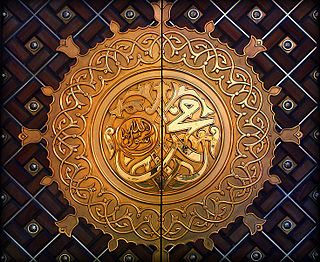See also
- Musa of Parthia, queen of Parthia c. 2 BC – AD 4
- Musa, a character from Winx Club
- All pages with titles containing Musa
- Moussa
- Musah (name)
| Pronunciation | /ˈmuːsə/ Arabic: [muːsaː] |
|---|---|
| Gender | Male |
| Origin | |
| Language(s) | Hebrew |
| Meaning | See "Moses" for hypotheses |
| Other names | |
| Alternative spelling | Mosa, Moosa, Mousa, Moussa |
| See also | Moses in Islam |
Musa is a male name of Semitic origin.
Umm Musa is a female name of Semitic origin. It meaning is mother of Musa.

Abū Jaʿfar ʿAbd Allāh ibn Muḥammad al-Manṣūr usually known simply as by his laqab al-Manṣūr (المنصور) was the second Abbasid caliph, reigning from 136 AH to 158 AH succeeding his brother al-Saffah. He is known for founding the 'Round City' of Madinat al-Salam, which was to become the core of imperial Baghdad.

Mansa Musa was the ninth Mansa of the Mali Empire, which reached its territorial peak during his reign. Musa's reign is often regarded as the zenith of Mali's power and prestige, although he features comparatively less in Mandinka oral traditions than his predecessors.

Abū Muḥammad Mūsā ibn al-Mahdī al-Hādī better known by his laqab al-Hādī (الهادي) was the fourth Arab Abbasid caliph who succeeded his father al-Mahdi and ruled from 169 AH until his death in 170 AH. His short reign ended with internal chaos and power struggles with his mother.
Sulayman is an Arabic name of the Biblical king and Islamic prophet Solomon meaning 'man of peace', derived from the Hebrew name Shlomo.
Jaʽfar, meaning in Arabic ”stream," is a masculine name of Arabic origin, common among middle eastern and Muslim men, especially in Iran.

Muhammad, also spelled Muhammed, Muhamad, Mohammad, Mohammed, Mahammad, Maxammed, Mehemmed, Mohamad, Mohamed, or in a variety of other ways, is an Arabic given male name meaning 'praiseworthy'. The name comes from the passive participle of the Arabic verb ḥammada (حَمَّدَ), meaning 'to praise', which itself comes from the triconsonantal Semitic root Ḥ-M-D. Believed to be the most popular name in the world, by 2014 it was estimated to have been given to 150 million men and boys.
ʿĪsā ibn Mūsā ibn Muḥammad ibn ʿAlī ibn ʿAbd Allāh ibn ʿal-ʿAbbās was a nephew of the first two Abbasid caliphs, al-Saffah and al-Mansur. He served as governor of Kufa in Iraq for fifteen years and led the suppression of the Alid revolt of 762–763. From 754 on he was also heir-apparent of the Caliphate, until he was pressured to cede precedence to al-Mansur's son al-Mahdi in 764. With al-Mahdi's accession in 775, he was forced to renounce his rights entirely in 776 in favour of al-Hadi, and retire to his palace at al-Ukhaidir Fortress, where he died in 784.
Ibrāhīm ibn al-Mahdī was an Abbasid prince, singer, composer and poet. He was the son of the third Abbasid caliph, al-Mahdi, and the half-brother of the poet and musician Ulayya. Ibrahim was contemporary of Abbasid caliph al-Hadi, al-Rashid and his three nephews caliph al-Amin, al-Ma'mun, al-Mu'tasim.
Zubaidah bint Ja`far ibn al-Mansur was the best known of the Abbasid princesses, and the wife and double cousin of Harun al-Rashid. She is particularly remembered for the series of wells, reservoirs and artificial pools that provided water for Muslim pilgrims along the route from Baghdad to Mecca and Medina, which was renamed the Darb Zubaidah in her honor. The exploits of her and her husband, Harun al-Rashid, form part of the basis for The Thousand and One Nights.
Harthama ibn A'yan was a Khurasan-born general and governor of the early Abbasid Caliphate, serving under the caliphs al-Hadi, Harun al-Rashid and al-Ma'mun. He played an important role in the victory of al-Ma'mun in the Abbasid civil war, but was executed at his orders when he protested against the power of the Sahlid family that dominated his court.
Mūsā ibn ʿĪsā ibn Mūsā al-Hāshimī was an 8th-century AD Abbasid prince. The son of Isa ibn Musa, he was posted to various governorships throughout his career, including Kufa, Egypt, Damascus, Mecca, Medina, and Arminiya, and was a leading commander at the Battle of Fakhkh.
Marājil was an umm walad of caliph Harun al-Rashid and mother of caliph al-Ma'mun.
Arwā bint Manṣūr al-Ḥimyarī also known as Umm Mūsā was the famous principal wife of Abbasid caliph al-Mansur and mother of third Abbasid caliph al-Mahdi.
Sulaymān ibn al-Manṣūr, better known as Sulaymān ibn Abī Jaʿfar, was an Abbasid prince and served as governor of Basra, al-Jazira and Syria during the reign of his nephew, Caliph Harun al-Rashid. He also served in Syria under al-Rashid's son and successor, al-Amin.
Umm ʿĪsā bint Mūsā al-Hādī was an Abbasid dynasty princess, daughter of caliph al-Hadi, niece of caliph Harun al-Rashid and principal wife of al-Ma'mun, the seventh caliph of the Abbasid Caliphate.
Fāṭimah bint Muḥammad al-Taymī was the third influential wife of the Abbasid caliph al-Mansur. She was the mother of famous prince Sulayman.
Lubābah bint Jaʿfar was an Abbasid princess, granddaughter of second Abbasid caliph al-Mansur, niece of third Abbasid caliph al-Mahdi and the principal wife of fourth Abbasid caliph al-Hadi.
Umm Muḥammad bint Ṣāliḥ was an Abbasid princess, niece of third Abbasid caliph al-Mahdi and wife of caliph Harun al-Rashid.
Ja'far ibn Abdallah al-Mansur was the elder son of second Abbasid caliph al-Mansur and elder brother of third Abbasid caliph al-Mahdi. As the elder son of al-Mansur, he was the candidate to the caliphal throne until his premature death.
Abbasa bint Sulayman was an Abbasid princess, daughter of Sulayman ibn Abi Ja'far, niece of Abbasid caliph al-Mahdi and wife of caliph Harun al-Rashid.